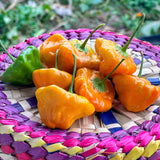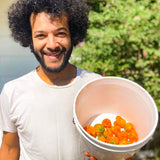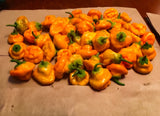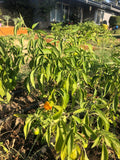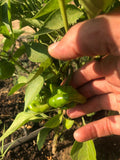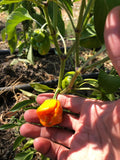Scotch Bonnet Pepper
Capsicum chinense
Scotch Bonnet Peppers are extremely hot and particularly important in West African and Caribbean cuisine, where they are used in hot sauces, jerk chicken, and many other dishes. Named for its shape, which looks like a tam o' shanter hat from Scotland.
This variety was selected and grown for our 2021 and 2022 catalogs by Rasheed Hislop and Rosalba Lopez Ramirez at Black Zocalo in California. Rasheed's father is from Trinidad and this is an important pepper to their family foodways. Rasheed's grandmother, Sylvia Foncette-Hislop, "Gran," taught him how to make pepper sauce in Cascade, Port of Spain, Trinidad among many other specialties over the years from childhood to adulthood. Rasheed's last name "Hislop" is also of Scottish origin as his great great grandfather was a Scotsman who traveled with his three brothers to the Caribbean in the 19th century as colonizers seeking their fortune. In this way, recognizing the often complex histories/herstories that we in the Afro-Caribbean often overlook to simplify the stories (but lie in the process!).
100,000-350,000 Scoville Heat Units.
Days to maturity: 90-110
Seeds per pack: 12-15
Germination rate: 96% on 12/16/2025
Planting / harvesting notes
Start seeds indoors 8-10 weeks before the last frost and transplant into the garden well after the danger of frost. Keep seedlings moist but do not overwater. Transplants should be initially watered in well, and plants will be most productive with regular irrigation and full sun. These abundant, lanky plants may have to be staked.
Seed keeping notes
Peppers are generally self-pollinating, though we isolate different varieties of the same species by at least 50 feet, in hopes that flying insects will not cross pollinate them unexpectedly. There are several important species of peppers, so check your scientific names! Pepper seeds are ripe when the fruits have turned their final fiery color - in this case, fiery-orange. Cut the fruit, scrape out seeds, and lay them out to dry on a labeled screen or paper product in a ventilated place away from direct sunlight for a week or two. Consider wearing gloves for your protection! Drying the peppers before seed extraction can slightly lower your germination rates, but works fine for home seed saving as long as the peppers do not rot.







